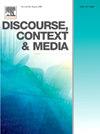“Mocking people for stupid opinions is not fun. Also it’s bad for business.” From using humour for webcare to polarization
IF 3.1
2区 文学
Q1 COMMUNICATION
引用次数: 0
Abstract
Today companies are encouraged to communicate with a sense of humour when interacting with stakeholders online, and they increasingly take sides on contested issues by engaging in corporate social advocacy. While both approaches to digital business discourse may have benefits, they may equally polarize. This study explores the use of a digital discourse strategy that combines using humour with taking part in socio-political debates to find out to what extent their combination fuels polarization and entails negative outcomes. Using a corpus linguistic methodology, this study explores a 4.5-million-word corpus of tweets posted by and addressed to the budget airline Ryanair between October 2020 and March 2023, when the airline increasingly used aggressive humour and took a stance on socio-political issues in its posts. The findings show that the topics Ryanair engaged with, often in a humorous manner, entailed heated discussions on Twitter, with several words pertaining to the respective topics being key in the corpus. At the same time, they resulted in dividing its client base, with some stakeholders explicitly expressing their appreciation of its discursive approach and others deploring it. While humour may thus enhance the polarizing effect of corporate social advocacy, it may also lead to increased user engagement with stakeholders frequently commenting on and talking about brand posts. Ultimately, the success of a company’s digital discourse strategy will be influenced by the interplay between its brand identity, the context of communication and the specific type of user engagement behaviour it intends to spark.
“嘲笑别人愚蠢的观点一点都不好玩。而且这对生意也不好。”从利用幽默进行网络护理到两极分化
如今,企业在与利益相关者在线互动时被鼓励以幽默感进行交流,它们越来越多地通过参与企业社会倡导,在有争议的问题上表明立场。虽然这两种数字化商业话语的方式都可能有好处,但它们可能同样两极分化。本研究探讨了将幽默与参与社会政治辩论相结合的数字话语策略的使用,以找出它们的结合在多大程度上加剧了两极分化并带来了负面结果。本研究使用语料库语言学方法,研究了廉价航空公司瑞安航空(Ryanair)在2020年10月至2023年3月期间发布和发送的450万字推文语料库,当时该航空公司越来越多地使用攻击性幽默,并在其帖子中表明了对社会政治问题的立场。调查结果显示,瑞安航空所涉及的话题通常以幽默的方式在推特上引发了热烈的讨论,语料库中有几个与各自主题相关的词是关键。同时,它们导致了其客户基础的分裂,一些利益相关者明确地表达了他们对其话语方法的赞赏,而另一些人则谴责它。虽然幽默可能因此增强企业社会宣传的两极分化效应,但它也可能导致用户参与增加,利益相关者经常评论和谈论品牌帖子。最终,公司数字话语战略的成功将受到其品牌标识、传播背景和它打算激发的特定类型的用户参与行为之间的相互作用的影响。
本文章由计算机程序翻译,如有差异,请以英文原文为准。
求助全文
约1分钟内获得全文
求助全文

 求助内容:
求助内容: 应助结果提醒方式:
应助结果提醒方式:


